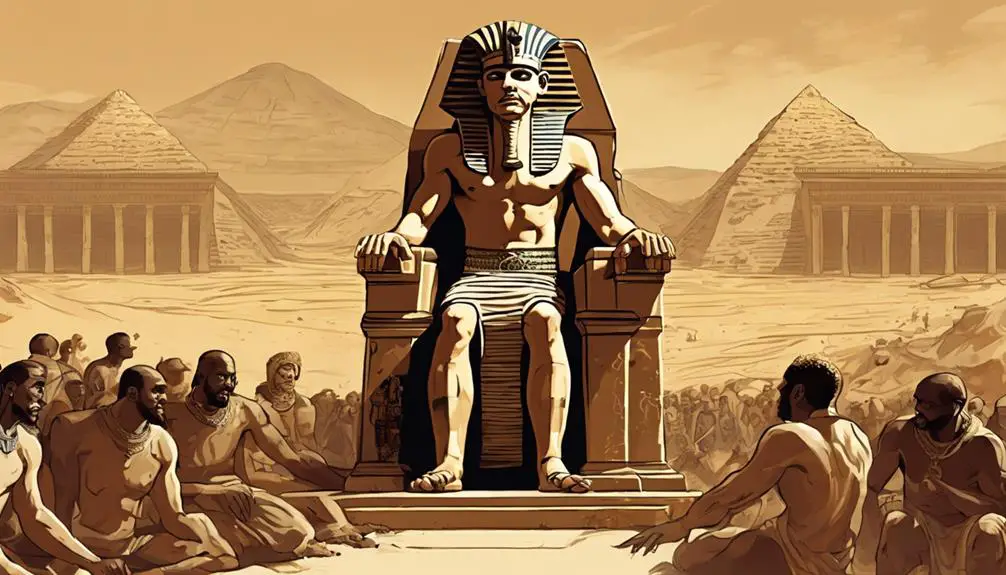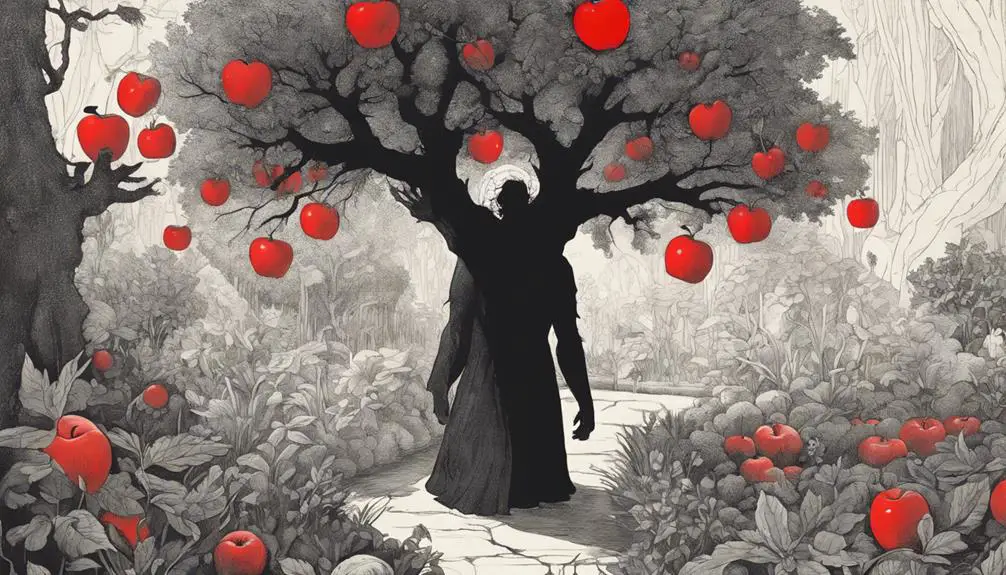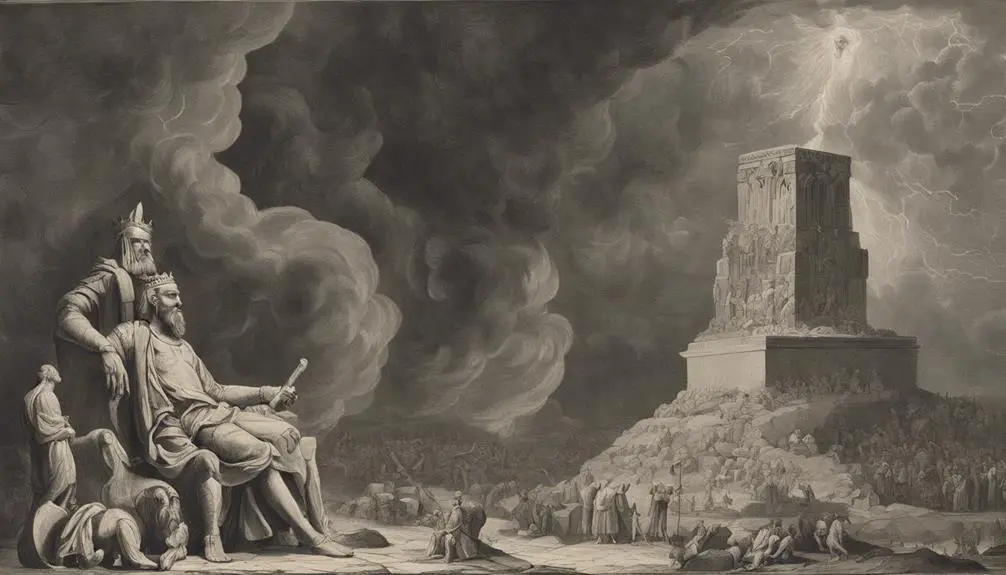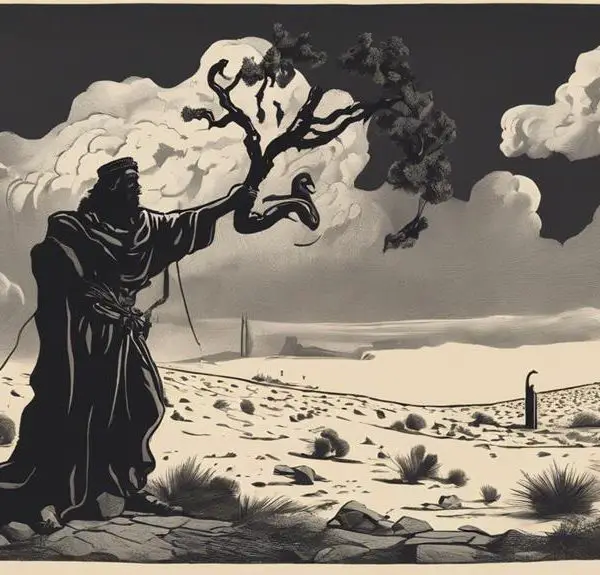Glimpse into the lives of Biblical villains, understanding their motivations and actions, and discover what it reveals about human nature and morality.

Bad Guys in the Bible
Have you ever wondered why the Bible features so many villains?
You're about to dive into the world of Biblical baddies, from the deceitful Pharaoh to the notorious betrayer, Judas Iscariot.
We'll explore their motivations, their actions, and the consequences they faced.
But more importantly, we'll try to understand what they reveal about human nature and morality.
By the end, you might just find yourself questioning who the real 'bad guys' are.
So, are you ready to uncover these intriguing perspectives?
Key Takeaways
- Biblical villains such as Pharaoh, Nebuchadnezzar, Judas, and Cain exemplify the destructive outcomes of power misuse, greed, and betrayal.
- Satan's deceptive tactics highlight the importance of spiritual vigilance and resistance to evil influences.
- Betrayal and treachery, as seen in the actions of Judas and Cain, underscore the dire consequences of envy and uncontrolled emotions.
- Stories of tyranny and sinful behavior, represented by Pharaoh and Nebuchadnezzar, stress the necessity of compassion, obedience to God, and humility.
The Deceitful King: Pharaoh

Delving into the narrative of the Deceitful King, Pharaoh emerges as a figure of manipulation and defiance, whose actions significantly impacted the Israelites' journey to liberation. Pharaoh's manipulation is evident in his cunning exploitation of the Israelites' labor, leading to their Egyptian enslavement. This is a man who saw the Israelites not as fellow humans but as mere tools to enhance his kingdom's wealth and power.
Through the lens of a scholar, you can see how Pharaoh's defiance of God's commands exacerbated the plight of the Israelites. He's not just a king making political decisions; he's a man who consciously chose to defy divine orders, intensifying the suffering of countless individuals. This defiance, combined with his manipulation, set the stage for a tragic chapter in biblical history.
Pharaoh's actions provide a stark portrayal of the harmful consequences when power is wielded without compassion or respect for human dignity. His story serves as a potent reminder of the enduring struggle against such tyranny, a struggle that continues in various forms to this day. As you delve deeper into this narrative, you'll gain a more nuanced understanding of the complex dynamics at play in this seminal biblical tale.
The Betrayer: Judas Iscariot

Turning our attention to Judas Iscariot, we encounter a figure whose betrayal is as notorious as it is complex. Judas was one of the twelve apostles, hand-picked by Jesus himself, making his betrayal even more shocking and profound.
To fully grasp Judas's actions, we must delve into his motivations. While the Bible doesn't explicitly outline Judas's motives, scholars have speculated various reasons:
- Judas's greed and love for money
- A desire for political revolution
- A misguided effort to force Jesus's hand
As for the betrayal consequences, they're nothing short of tragic. Not only did his actions lead to Jesus's crucifixion, but his guilt also drove him to suicide.
It's also important to note that his betrayal had spiritual implications. It served as a catalyst for the fulfillment of prophecy and the commencement of Christ's redemptive work. Yet, it's a stark reminder of the destructive power of greed and misplaced loyalty.
The Tempter: Satan

Shifting our focus from human frailty to supernatural manipulation, let's examine the role of Satan, often referred to as 'The Tempter' in the Bible. You'll find that Satan's influence is pervasive, and his temptation tactics are cunning. He operates in the shadows, subtly manipulating circumstances and exploiting human weaknesses.
Consider the table below illustrating Satan's tactics and their biblical references:
Temptation Tactics |
Biblical References |
|---|---|
Deception |
Genesis 3:1-5 |
Doubt |
Matthew 4:1-11 |
Distraction |
Luke 4:13 |
Destruction |
Job 1:6-22 |
Deception, the first tactic, is seen in the Garden of Eden where he misled Eve about God's command. Doubt, his second tool, was used against Jesus during his forty-day fast in the wilderness. Distraction, another tactic, was employed after Jesus' temptation, where Satan left him "until an opportune time", implying a return. Lastly, Satan uses destruction, as illustrated in Job's life, where Satan brought tremendous suffering upon Job to make him renounce God.
Understanding Satan's tactics offers insight into his role as 'The Tempter'. It sharpens your discernment, helping you withstand his subtle influences.
The Defiant King: Nebuchadnezzar

Now, let's dissect the story of Nebuchadnezzar, the defiant king whose pride and arrogance led to his downfall as detailed in the Book of Daniel. You'll find that Nebuchadnezzar's pride was his Achilles heel, blinding him to his own faults and leading him to defy God's warnings.
- Nebuchadnezzar's Pride: He was a man of immense power, but his haughtiness clouded his judgement. He failed to acknowledge the source of his success, attributing it all to his own capabilities.
- Babylonian Influence: As the king of Babylon, Nebuchadnezzar wielded considerable influence. Yet, he used this power not for the good of his people but to fuel his ego, constructing an enormous golden statue and demanding its worship.
- God's Punishment: God, in response to Nebuchadnezzar's defiance, stripped him of his sanity and kingdom, reducing him to a beastly existence.
This tale serves as a stark reminder of the dangers of unchecked pride. Nebuchadnezzar's story is a testament to the biblical truth that 'Pride goes before destruction, a haughty spirit before a fall' (Proverbs 16:18). His downfall illustrates the inevitable consequences of arrogance and the importance of humility before God.
The Treacherous Sibling: Cain

Delving into the narrative of Cain, you'll encounter the first recorded act of fratricide in biblical history – a dark tale highlighting the dangerous consequences of jealousy and anger. This narrative's complexity is underscored by Cain's motivations, which remain a subject of considerable debate among scholars.
Aspect |
Cain's Perspective |
Abel's Perspective |
|---|---|---|
Offering to God |
Gave fruits of the soil |
Gave fat portions from firstborn of flock |
God's Response |
Did not look with favor |
Looked with favor |
Cain's Reaction |
Angry, downcast |
Not recorded |
God's Warning |
If you do right, will you not be accepted? |
Not applicable |
Outcome |
Kills Abel out of jealousy |
Murdered by brother |
Cain's motivations are complex, encompassing his feelings of inferiority due to God's rejection of his offering, and his jealousy of Abel, whose offering found favor with God. This brotherly conflict escalated tragically, with Cain allowing his anger and resentment to lead him to commit the first murder recorded in the Bible. The story of Cain serves as a potent reminder of the destructive power of envy and the importance of managing one's emotions.
Frequently Asked Questions
Did Any of These Bad Guys in the Bible Ever Show Any Signs of Remorse or Repentance for Their Actions?
Yes, you'll find instances of remorse and repentance.
Notably, Judas Iscariot, infamous for his betrayal of Jesus, was exceptionally remorseful, even returning the silver he'd received. His guilt led him to take his own life.
Pharaoh, ruler of Egypt during the Israelites' enslavement, also showed signs of repentance. Though he hardened his heart multiple times, he eventually allowed the Israelites to leave, indicating some level of remorse for his actions.
Are There Any Female 'Villains' Highlighted in the Bible?
Yes, the Bible does highlight female 'villains'. Their impact is significant and interpretations of these female evildoers vary.
Notable examples include Jezebel, who incited her husband to do evil, and Delilah, who deceived Samson leading to his downfall.
Each character's actions had profound effects on the Biblical narrative, showing that women, like men, had the capacity for both good and evil.
How Did These 'Bad Guys' Influence the Development of the Biblical Narrative as a Whole?
You're examining how antagonists shape a narrative. In this case, the 'bad guys' play a critical role in the Bible. They provide contrast, challenge the protagonists, and ultimately help convey moral lessons. Their actions often result in biblical consequences, shaping the overall narrative and themes.
Without these antagonists, the biblical stories wouldn't have the same depth and moral complexity. They're integral to the narrative's development, teaching lessons about righteousness and the consequences of wrongdoing.
How Are These Characters Portrayed in Other Religious Texts, if at All?
In other religious texts, these characters' portrayal varies greatly, highlighting the comparative representation and interpretation diversity. You'd find that their deeds, motives, and consequences differ, sometimes drastically.
This reflects the unique cultural, theological, and historical contexts of each religion. You'll notice that these variations offer a more nuanced understanding of these characters, challenging the simplistic 'bad guy' narrative.
Can Any of These 'Bad Guys' Be Seen as Sympathetic or Misunderstood, From a Different Perspective?
You can indeed find unseen virtues and moral ambiguity in many characters. Viewing them from a different perspective, one might see them as misunderstood or even sympathetic.
Their actions, while seemingly villainous, might be driven by complex motives or circumstances. It's all about perspective, and questioning the traditional narrative can lead to a deeper understanding of these characters and their roles.
Conclusion
In conclusion, you can observe that the Bible's villains, like Pharaoh, Judas, Satan, Nebuchadnezzar, and Cain, play crucial roles in the narrative. They're not just 'bad guys' – they exemplify human failings and challenges. Each one's defiance and treachery serve as cautionary tales, teaching us about the perils of succumbing to temptation, betrayal, and arrogance.
These characters compel us to reflect on our actions and encourage us to strive for virtue and righteousness.



Sign up